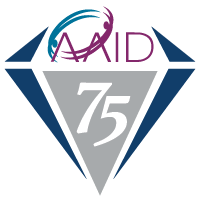Ethics & Due Process
Ethics Committee Procedures
updated 01/23/2023
- Any person may file a complaint with the Executive Director. The allegations shall be in writing, signed by the complaining party, and contain the facts upon which they are based.
- The Executive Director shall forward the information to the Chair of the Ethics Committee who shall determine whether the allegations are within the committee’s jurisdiction and whether or not, if true, would constitute a violation of the AAID’s Bylaws by a member or members of the AAID.
- The chair shall determine if it is feasible to facilitate a resolution of the issue(s) through mediation.
- If a resolution is not reached, the chair shall involve the committee and offer the parties an opportunity to submit written, position statements.
- The committee shall conduct an investigation and a hearing, either in person or via teleconference, in order to make its own determination relative to the truth of the allegations under consideration and whether or not the evidence supports a finding of an actionable violation of the AAID Bylaws.
- The committee may recommend one of the following:
- That the charges be dismissed.
- An order to cease and desist.
- Reprimand (private).
- Censure (public).
- Suspension of membership for a specified period of time.
- Termination of membership with leave to reapply at a specified future date.
- Expulsion or permanent termination of membership.
- Should any committee action require the involvement of the Board of Trustees in accordance with the Academy’s Bylaws, the Board of Trustees shall review the committee’s recommendation and make its decision at its next regularly scheduled meeting.
Due Process Procedures
Adopted 2008. Revised 9/2020.
Under Article III, Section 12 of the AAID Bylaws, the Board of Trustees, by affirmative vote of majority of all of the members of the Board present and voting, may suspend or expel a member for cause after an appropriate hearing, conducted in accordance with due process procedures adopted and approved by the Board of Trustees. Misconduct by an AAID member, individually or in concert with others, including but not limited to the following acts or omissions, may constitute cause and be grounds for discipline:
(a) Any act or omission which violates the policies and provisions set forth in the Academy’s Bylaws or Policies duly adopted by the Board of Trustees.
(b) Any act or omission related to the conduct of the member’s business or practice which violates the federal, state or local criminal laws of the United States including but not limited to, a conviction of a felony or other crime of moral turpitude.
The due process procedures are as much an evaluative tool as they are a punitive one. Upon receipt of an allegation of misconduct by a AAID member, the AAID President, together with the Executive Director and AAID Legal Counsel, shall initially review the allegation and determine if conduct involving cause may have occurred and therefore be grounds for discipline.
If sufficient evidence exists, based upon this initial review, the matter will be turned over to the Executive Committee to determine, by majority vote, whether to proceed and take the matter to the Board of Trustees. If the Executive Committee determines that insufficient evidence of cause exists, the matter shall be dismissed. If the Executive Committee determines that sufficient evidence does exist that misconduct by an AAID member involving cause may have occurred, a hearing should be held by the Board of Trustees.
The President shall notify the AAID member, the complainant, and the Board of Trustees of the date, time and place of the hearing at least thirty (30) calendar days in advance of the hearing. The AAID member shall have the right to appear and will be allowed the opportunity to make statements and present evidence which is relevant or potentially relevant. The hearing shall be closed to all except the Board of Trustees, complainant; the AAID member and his/her legal counsel; AAID Legal Counsel; and AAID Executive Director.
In closed session, the Board of Directors shall discuss the allegation and matters brought forth in the hearing, arrive at a decision by a majority affirmative vote, and if necessary, recommend any of the following disciplinary actions: suspension for one year, extended suspension up to but not more than three years, or termination of membership. The Board’s determination shall be final and not subject to further review.
Submitting an Ethics Complaint
The American Academy of Implant Dentistry (AAID) offers a complaint process for all of its member dentists. Please review and complete this complaint form and submit it. It will be referred to the AAID Executive Director and to the Chair of the AAID Ethics Committee. Please provide any supporting documentation via email to ethics@aaid.com.
Ethics Complaint Submission Form
Links for further reference:
